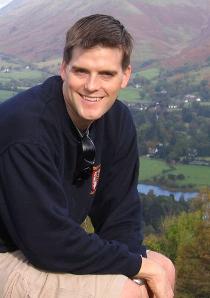Archbishop Cranmer Award, Hunter Powell
July 24, 2009

"One of the main aspirations of the Church History Department at Westminster is to cultivate appropriate historical method and sensibilities in our students, such that the skills and approach they learn here can be of service to them when they leave, whether informally, in reading history for pleasure, or formally, in further study.
"...It is great to know that Hunter’s grounding in historical method at Westminster has helped to serve him well in his advanced studies at Cambridge, and a personal delight to hear of his success in being awarded this prestigious prize. I suspect he is too generous in his kind words about me; but I have always regarded the task of the professor as not that of producing disciples but of making himself redundant by helping his students to be better than he is himself. I suspect by that criterion, I did a good job with Hunter!"
- Dr. Carl R. Truman, vp for academic affairs
"The PhD is certainly the most challenging project I have ever worked on, but I can also say that I have never enjoyed a challenge quite as much. My topic revolves around the ecclesiological debates of the Puritan Revolution.
More specifically, I am studying the leading congregational divines of this period, known during the Westminster Assembly as the Dissenting Brethren. These divines, perhaps more than any other group during the Civil Wars and the Interregnum, became the leaders in crafting a national church that temporarily replaced the Prelacy. Indeed, my MPhil at Cambridge was a dissertation on the Savoy Declaration of Faith and Order, written by the Dissenting Brethren at the twilight of the Cromwellian era. In other words, I know where they ended up, now I am trying to figure out how they got there!
"The scope of my topic focuses primarily on the years leading up to and through the Westminster Assembly, focusing on the ecclesiological debates that pervaded those complex years. This is a timely topic given the current work being done on the Westminster Assembly by Dr. Chad Van Dixhoorn here at Cambridge.
"Studying the often subtle and nuanced distinctions between the competing polities of the 1640s has reminded me of the importance of ecclesiology in religious education, a topic that is occasionally sidelined in favor of theological debates. In terms of my current project, I am also reminded how much we need to apply our historical theology to the field of ecclesiological history and formation.
"As a History student I am forced to grapple with theological and ecclesiological trajectories that were influenced and formulated over time and in the face of complex circumstances. In other words, we are missing the Richard Muller equivalent for ecclesiology. I hope my dissertation can begin to fill that void.
"My former pastor, Phil Ryken, once told me from experience that moving to England would be daunting, but not impossible. The most daunting aspect of the move was taking a family of four overseas and jumping into full time research. In the process the Lord has blessed with a wonderful home, a godly church, caring friends, and most importantly our first daughter, Katharine Elizabeth, born in 30 days before I started my PhD. Indeed, the one of the great highlights, as a father and a husband, has been watching my family grow and thrive in this new environment.
"I have loved being back in a University setting and continually thank the Lord for the success I have had thus far in the PhD process. All of this would have been impossible without Westminster Seminary. I continue to be grateful to Carl Trueman, who allowed me to test these waters through independent studies while at WTS. His influence on me has been invaluable at Cambridge. Getting to develop friendships with Christians and non-Christians in England has undoubtedly molded me for the ministry in unexpected and exciting ways. The
Archbishop Cranmer studentship** is yet another visible sign of the Lord’s kind provision along the way."
- Hunter Powell, MDiv, '07
**Archbishop Cranmer studentship criteria (i) award the Archbishop Cranmer Prize for an essay on the intention and result of the changes in doctrine, organization and ritual within the Church of England between the years 1500 and 1700; (ii) elect one or more studentships, the holders of which will be engaged in pursuing original research in English ecclesiastical history between 1500 and 1700; (iii) award grants for the furtherance of research in English ecclesiastical history between the years A.D. 1500 and 1700.







